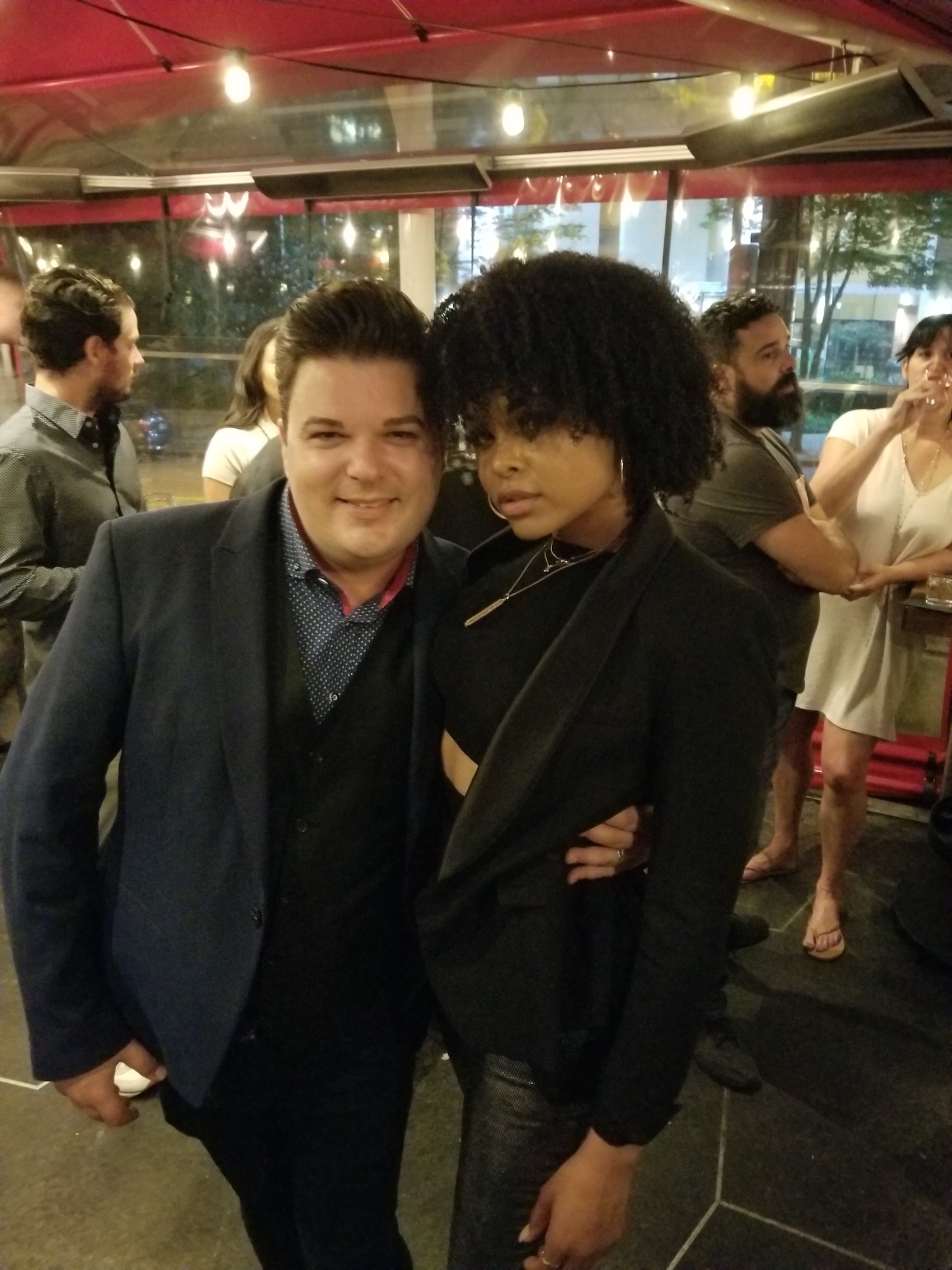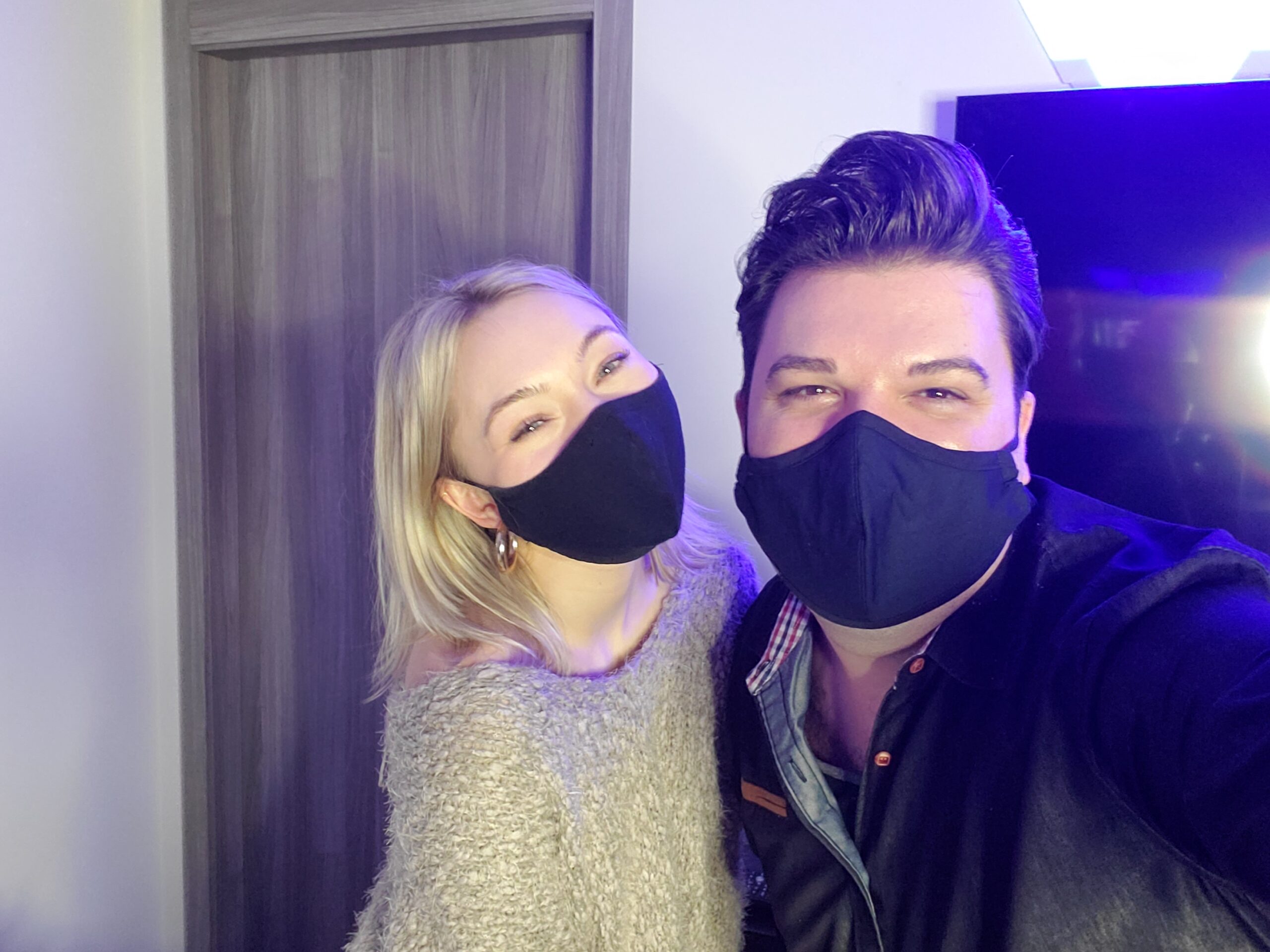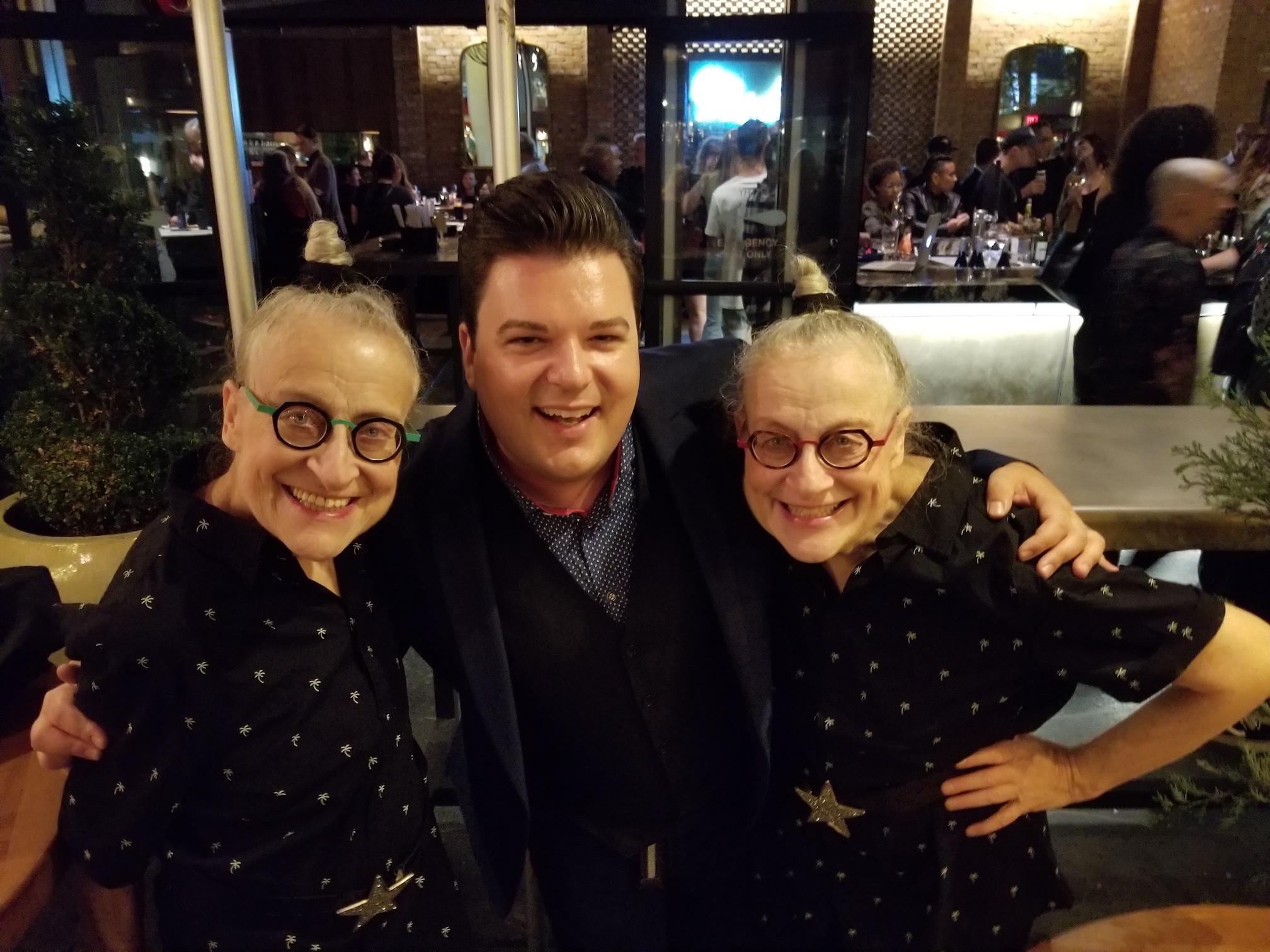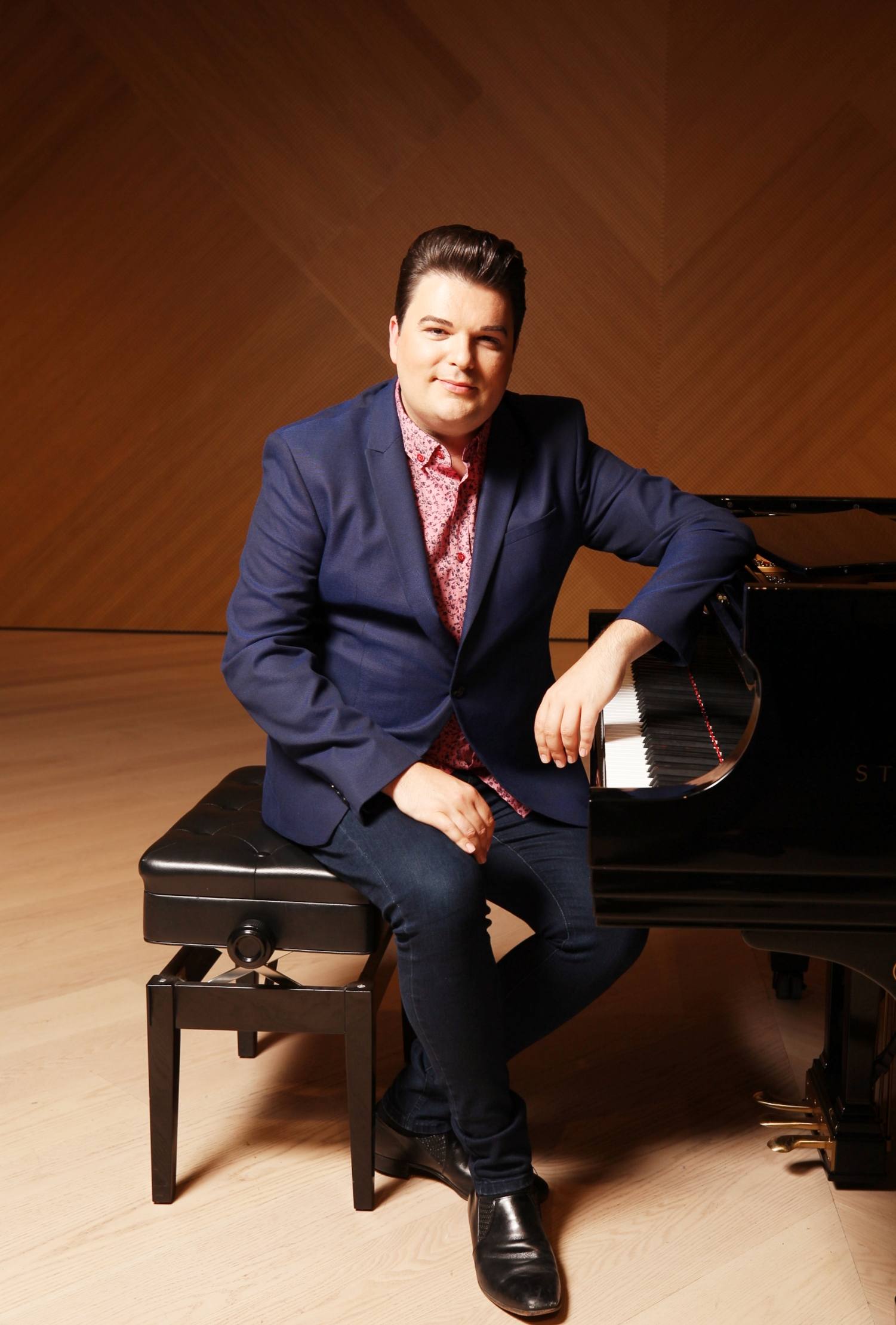Have you ever stopped to consider the many different ways that we use our voice? It’s not just for talking after all, we use it to sing, to whistle, to make bird impressions, other animal sounds and even to scream when we’re scared. Besides talking, singing has become a living for some. I do believe that opera singing is at the top, when you consider it a form of art. It requires very intense highs and extremely low lows, with a duration, that seems impossible to replicate. It is the highest echelon of singing and probably the oldest form of singing. I admire anyone that can do it… but someone that can do it extremely well, is Frédérik Robert. He is a renowned vocalist and is currently coaching series lead, Taylor Hickson, Lyne Renee and other cast members on Disney’s Freeform Motherland: Fort Salem.
His role on the series involves working with the actors on songs, vocal magic (the main superpower of the witches on the series) and teaching the actors the brand-new language ‘Menishe’, also known as Mothertongue, written specifically for the show by David J. Peterson (Game of Thrones, The Witcher, The 100) and Jessie Sams.
Motherland: Fort Salem is an American supernatural drama television series created by Eliot Laurence. The series stars Taylor Hickson as Raelle Collar, Jessica Sutton as Tally Craven, and Ashley Nicole Williams as Abigail Bellweather, who are three witches enlisted in the U.S. Army. The first season of Motherland: Fort Salem is streaming now on Hulu, Disney+, Freeform, and Amazon Prime U.S. The second season is set to air this summer on Disney’s Freeform, ABC Spark (Canada) and will stream on Hulu, Disney+, and Freeform.
Frédérik, was an original member of The Tenors (formally The Canadian Tenors) and founding member of Romanza – The Art of the Tenor. He has vast coaching experience, working with actors and clients including Holly Deveaux (Shadowhunters), Caitlin Stryker (Clarice), Bradley Stryker (CSI: NY, Lost in Space), Nicole Maines (Supergirl) Catherine Lough Haggquist (Supernatural, The Good Doctor), Marci T House (Godzilla), Dave Faber (Faber Drive, Juno Nominee), David Beckingham (Hey Ocean! Juno Nominee), Frankie Cena (Sing On! Netflix Champion), Dorjay the Singing Shaman and many more.
After 30 years of performing, his calling changed to just focus on his teaching career. His eclectic studio includes actors, musical theatre performers, opera singers, contemporary music artists, voices in transition, vocal rehab clients, and more. He is also on the College faculty and is the Program Coordinator for the Musical Theatre training program at the Vancouver Academy of Music.
Frédérik Robert was my guest today and we had such a fun and informative conversation.
HNM “This is a fascinating position, to be a vocal coach on a show with so much buzz (Motherland – Fort Salem). Is this your first TV show?”
FRÉDÉRIK “It’s my first series and my first involvement within the actual process. I’ve assisted as a coach in other aspects; helping actors with auditions, helping an actor perform a song in a Hallmark movie, there was another actor in a Lifetime movie – I’ve helped people in the film and TV world in various capacities, but this is the first time I’ve been brought back after the pilot had shot. They’ve been asking me back for various things, the show focuses so much on vocals. Our working relationship had built over the first season and by the time the second season rolled around, people really enjoyed upping the ante. If something is working on the show, it gets opened up and more of it gets incorporated. The vocal component was a huge deal, as well as the language… which was written for the show, which I also coach.”
HNM “Were you also one of the creators of the language, Méníshè?”
FRÉDÉRIK “The language was not created by me. David J. Peterson, who is probably the most renowned language creator on the planet – is the one that created it. He created the language for Game of Thrones, The 100, The Witcher, the list goes on… it’s mind-blowing. He wrote the language with Jessie Sams, who’s also a linguistics expert. They worked together as a pair on this one.”
HNM “Is it quite challenging to have to expand on a new language?”
FRÉDÉRIK “Oh yes! As a singer for 30 yrs., the ladder part of my career was in opera, so I sang in many different languages. The last time I counted, I sang in 12 different languages and I only speak 2. I think it really prepared me for the work I do here. I had to learn how to imitate with my voice, the language – perfectly, so it would be convincing to the person listening to me speak the language.”

HNM “Could you describe what a regular day would look like as a coach on the set of Motherland – Fort Salem?”
FRÉDÉRIK “On a regular day, I’d arrive in the morning for the blocking of the scenes, then go behind the scenes with the actor to do a rehearsal to solidify the piece they’re doing that day, if they’re doing the vocal magic. I’d stay for the end of the scene/scenes and I might be brought somewhere else to rehearse a scene for another day. If there’s a scene shooting 2 days from then, I might be rehearsing that actor in a touch up rehearsal/first rehearsal, depending on the difficulty in their scene. That would be a typical day, but some days I’ll also go into the studio, such as today – one of the actors is singing something pre-recorded. We’ve gone over the rehearsal process of creating what they’re doing and now we’ll go into the studio and record it, it’s a real mixed bag.”
HNM “What types of vocal exercises, would you be working on together?”
FRÉDÉRIK “The funny thing about the show… is that the vocal magic being performed – isn’t really human, so there’s really no way for the person to truly recreate the sounds that they’re hearing. The creative but challenging bit that I love to do is, to teach them how to create a sound within their body that would most resemble the sound that they’re singing along to. Sometimes that means, they might be making silly noises to imitate the general landscape being created on a sound design level. My job is to make it appear that the actors look like they’re making the sound. Often times, they’ll incorporate some of the sounds they’re making that day and mix it into the sounds they’ve pre-created. It’s a really unique creative process and the actors really need to step out of their comfort zone (laughing) because it’s not normal, it’s not glamourous singing on a vocal-magic component. There are moments when they really do sing and get to use their real colours.”
HNM “What was the catalyst for initiating your position on the show?”
FRÉDÉRIK “I was contacted by one of the co-producers that found me online. It was total serendipity that they found me… little did they know, I had a unique skill set for doing so many other things. My teaching biography demonstrates quite a comprehensive list of work that I’ve done with singers. I have a very eclectic client list, from vocalist’s singing all genres, I coach people coming out of speech therapy, voices in transition – meaning, transsexuals going from male to female or female to male; I’ve done some intense work in that area on a vocal level. Considering that I have such an interesting range of things that I do, it seemed to make all the difference for them in hiring me… and they kept me, so I’m very lucky.”
HNM “It must be quite a large team that you work with?”
FRÉDÉRIK “It’s an amazing team. We have Eliot Laurence, the creator of the show and he’s such a kind human being. The world that he’s created is so interesting and everyone on the team is so onboard for this world – we keep envisioning it with him and keep growing it together. We’ve had an amazing team this year, including our executive producer and our director for several episodes, Amanda Tapping, we have Brian Studler, co-exec. producer Tracey Jeffrey, who’s somewhat of an icon in Vancouver. It’s a really fantastic team and that’s on the producing end. We also have the technical team – which is extremely savvy. Our post production person, Joel De Oliveira is absolutely incredible and the mastermind behind the scenes. The sound designer is the main person I work with, because that’s the work I have to translate on set.”
HNM “You are one of the original members of The Tenors (formally The Canadian Tenors). Congratulations, I think that’s amazing.”
FRÉDÉRIK “That was a long time ago, The Tenors have been through many incarnations. The original group was 3 men and at the very beginning, one of the members did one performance before recognizing it wasn’t his jam. After the first concert, the manager flew me into town after their first performance. My audition was a live concert with them. It was a very unique time for me, I’d just come out of some fairly serious training I’d been doing with a teacher, so I was chomping at the bit to start a career… of any kind. I was aiming for opera and I landed in crossover, which made a lot of sense for me – I was a musical theatre singer, I could do pop and I could do opera. I’m a perfect fit for a classical crossover musical, because it incorporates many of those aspects, in addition to the classical opera component. Apparently, they liked me, because they kept me on. Some years later, we detached from The Canadian Tenors and started our own group, called Romanza. That group went on to perform all across North America for 10 years and we had a good run. In fact, we were one of the top selling shows in the showcase, which is a way to get into the theatre circuit.”
HNM “How many nights per year would that entail performing?”
FRÉDÉRIK “Oh… that’s hard to say – hundreds. In those 10 years, we worked hard and would be on tour for 3-4 months at a time, a couple times per year.”
HNM “Were you training since your childhood?”
FRÉDÉRIK “I actually started when I was 7… by the time I was 8 I was concertizing, singing for retirement homes and churches across Alberta. My very first teacher was the local priest and felt that my talents should be shared. Since I wasn’t interested in sports, it suited me just fine, even though I had terrible performance anxiety. It took me much of my childhood struggling with it. Even into my later years, I’ve had performance anxiety, but I’ve managed to perform with it, somehow.”
HNM “I was hoping you could explain the science behind vocals. What would be the first place you’d start with someone, coming in for a singing lesson?”
FRÉDÉRIK “When I see someone for the first time, it’s a matter of understanding what their goals are for their singing, first and foremost. Within that, I have a better reality check of their particular goal. There’s a reality that comes in, that I need to know regarding their expectation and what I’m able to offer. Normally, I would ask them to tell me which vocal exercises they’re doing… if they say they’re not, then I’ll lead them through exercises that I’ve chosen for them. Very quickly I can determine what the range is, what the limitations are and where the impediments are at that moment. Every voice has impediments, the voice isn’t perfect. The key is, to find those impediments and not shy away from them, but to learn to work with them, mask them, find a way to massage them. After that, typically we’ll go into their music and start refining some of those technical skills back into their music.”

I went on to ask Frédérik to demonstrate a couple vocal exercises. Which he gladly obliged to. We first started with some simple lip rolls, where you create a bubbly feeling with your lips. As it turns out, it regulates air flow and if you can do it seamlessly (where it doesn’t split), then you’re actually connecting to your legato as well. Frédérik tells me, “Legato, is this beautiful feeling of everything being connected within the voice.” Unfortunately, I was not able to reach my legato, but he had another lesson waiting to teach me – all was not lost. We moved onto an exercise that opens up the voice, that I’ll call OOOHH’s and EEEEE’s! It was all about finding your resonance quicker through the OOH’s and AWE’s or finding the resonance through the frontal vowels, such as E, A and UE. Frédérik then demonstrated the sounds, at 10 am… and it was magnificent! Thank you so much for that Frédérik! The exercise is designed to warm up your resonators – which I didn’t even realize I had. Now I warm them up on the bus, the sky train, the grocery store…
He went on to tell me the other two components to the singing exercises, which is – relaxation and proper support engagement. His expertise on the voice went far beyond my comprehension but I certainly had a much higher appreciation for great vocals… it takes practice, just ask the neighbours in my building.
HNM “What would you say, when others are trying to discourage someone to sing?’
FRÉDÉRIK “I don’t think there’s ever a time where people should be discouraged from singing, because it’s one of those things that are so liberating and can be so healthy for the psyche, the heart and the voice. I never discourage someone from singing but I think there are certain teachers for different times. I’ve been a teacher for 20 years and in those early years I’ve taught a lot of different kinds of singers – some were tone deaf. I never prevented myself from working with any of those singers. First of all, I had a lot to learn from working with any kind of singer and I didn’t want to prevent myself from the learning experience. I think it’s a harsh thing to discourage someone to do anything in their life. People have their own reasons for doing it that we don’t always understand. When someone comes to me and says I want a career… that’s when we have to have another conversation and some reality checks regarding that. Sometimes I’ll encourage them to go into music history or perhaps music theory – we have to have those kinds of conversations. I teach at college, the Vancouver Academy of Music that offers music degrees. Some conversations with some students have to go there.”
HNM “Are there any no no’s that you shouldn’t do the day before a performance?”
FRÉDÉRIK “Wear and tear on the voice is generally not a good plan, such as screaming or tremendous coughing can be quite violent on the throat. I learned very early in my career and with The Tenors, that you will have a hard time being a performer if you have too many superstitions. There are so many elements that you can’t control. Something that I’ve learned throughout my career is… if you stress about things you will have a harder time. The voice will not cooperate when you’re stressed out. You either need to deal with your performance anxieties, dealing with the stress in your life or meditation – it’s one of the things I learnt how to do in the ladder part of my career, to relax and get into the parasympathetic system prior to performing. Another thing is to grow a very good sleep habit, it’s so important for recovery. Those are the ones that are important to me – stress, sleep and non-violence on the throat. Some people will say to me, ‘should I have that glass of wine the night before?’ I tell them that I had a glass of wine after every performance. If it bothers you, don’t do it.”

Frédérik Robert must be an incredible coach because I’ve been singing throughout this entire article and nobody has pounded on the walls. I call that success! Please watch Motherland: Fort Salem to truly appreciate an amazing and original series with strong female performances. Appreciate the magic of extreme vocals and a new language… that I’m still kind of working on.

